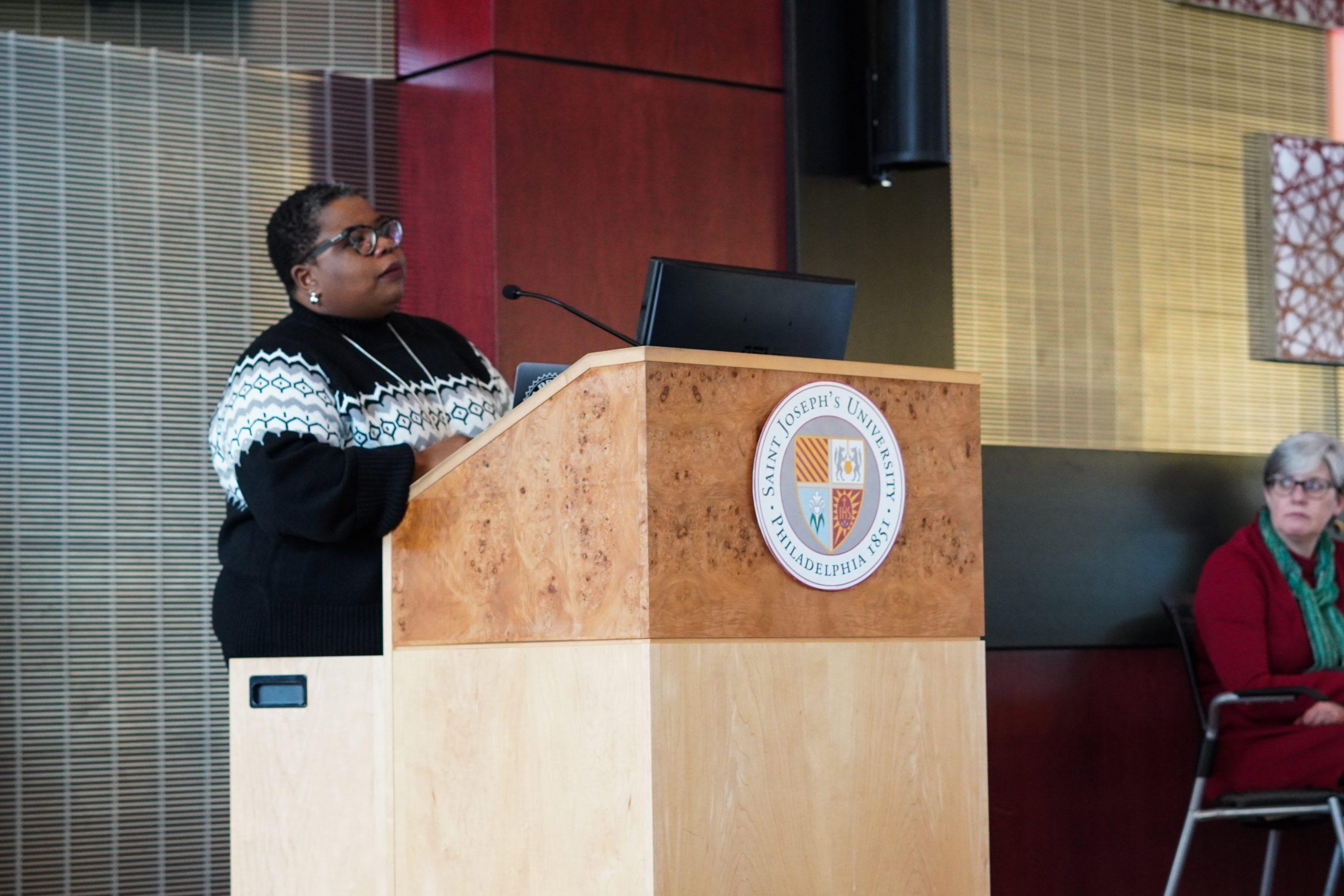Three music historians, specializing in music making and development in Philadelphia African American communities, spoke about their research to students in the Cardinal Foley Campus Center on Feb. 21.
Those historians were Kristen Turner, Ph.D., an adjunct professor of music history at North Carolina State University, Philip Gentry, Ph.D., assistant professor of music history and literature at the University of Delaware and a musicologist primarily focusing on 20th Century U.S. music and politics; and Tammy Kernodle, Ph.D., professor of musicology at Miami University and president of the Society for American Music who specializes in areas of African American music such as classical, popular jazz, along with issues surrounding gender in the industry.
Turner began the talk and spoke on the disappearance of black music culture in the U.S. She said this phenomenon is largely a result of two things: information doesn’t make it into the archives, and many institutions have historically not put value on the music and culture, leading them to not want to store it in the archives. This makes it difficult to recognize black artists’ influences.
“I’m constantly meeting people that have no idea that there are musicians of color that they can emulate,” Turner said.
This pattern whereby black artists are overlooked is still alive today, according to Turner. She said it’s prominent in classical and country genres.
“We have a sense of what someone is supposed to look like to perform a certain kind of music, and if you don’t fit that mold, then it’s very hard to break through,” Turner said.
Natalie Walker Brown, director for Inclusion and Diversity Educational Achievement, helped organize the event. She said when people think of Philadelphia music, they tend to have a narrow view as a result of a lack of recognition and attention given to artists of color.
“I appreciated hearing from scholars who have a background in so many different areas,” Walker Brown said. “In pulling those together, they were able to talk about the lack of discussion in Philadelphia music, whether it’s opera, neo-soul, Doo-wop. Just the opportunity to discuss the different music and sounds is a great opportunity.”
Gentry discussed nostalgia associated with Doo-wop. Doo-wop was a genre created by black artists in the 1940s. It’s sounds were largely rhythm and blues. Gentry said white people tend to look at that era as one of “simpler times.”
“Back in ‘simpler times,’ there was massive segregation,” Gentry said. “The common view of nostalgia is a somewhat conservative force that people want something simpler; i.e., they want the bad days for many other people.”
However, Gentry doesn’t want to designate nostalgia as a solely white idea.
“Other people have nostalgia as well,” Gentry said. “If someone remembers the 50s, they’re certainly remembering the bad things as well. Back in that time there was a sense that maybe they would solve these things.”
Dustin Dinh ’20, a music and computer science major, attended the event because he was interested in learning about black music history in Philadelphia.
“I discovered aspects of African American music in the city and how music was historically valued along with how it affects African American communities today,” Dinh said.
Kernodle discussed how historically artists’ messages create a perception of African American communities, affecting how the public views them. Kernodle focused on neo-soul, a genre that emerged in the 1990s with artists such as Jill Scott and Musiq Soulchild. She said the genre’s message contrasts that of hip-hop, which presents dark cityscapes and a lack of engagement in the community.
While urban spaces like this exist, they aren’t the only urban spaces, according to Kernodle.
“When you look at the videos of Jill Scott, they don’t show urban decay,” Kernodle said. “It shows a vibrancy of urban life and community. When I look at these videos, it shows that Philadelphia may not have been a paradise, but there is still a vibrancy. There’s still an aspect that says you can take
a long walk. You can play as a child. You can have dreams.”
Walker Brown said all of these insights gave students an opportunity to learn something outside of their areas of interest and further the conversation.
“The things I appreciate about that conversation were talking about how important representation was, how those sounds have developed and influenced music today,” Walker Brown said.














































